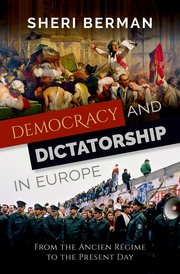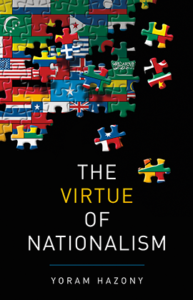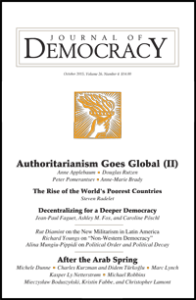 Just as optimism over communism’s collapse and liberal democracy’s triumph masked underlying realities, so does Robert Kagan’s pessimism that strongmen are striking back warp understanding, argues Sheri Berman, a professor of political science at Barnard College, Columbia University.
Just as optimism over communism’s collapse and liberal democracy’s triumph masked underlying realities, so does Robert Kagan’s pessimism that strongmen are striking back warp understanding, argues Sheri Berman, a professor of political science at Barnard College, Columbia University.
Globally, the condition of democracy remains strong. Democracy does face threats, but the “gravest one” comes not, as Kagan asserts, from without — from “resurgent authoritarianism” — but from within, from the failures of Western elites and governments, she writes for the Washington Post:
Let’s start with arguments about “resurgent authoritarianism.” Empirically, the evidence for this is thin. The number of democracies today remains close to its all-time high: There were 11 in 1900, 20 in 1920, nine in 1940, 32 in 1970, 77 in 2000 and 116 in 2018. Moreover, the undertow following the democratic wave that began in the late 20th century has been weak: It left many more democracies in its wake than previous waves of democratization in 1848, 1918 or 1945. Today’s authoritarian regimes are also less authoritarian than their predecessors, according to a new study by Anna Lührmann and Staffan I. Lindberg in the journal Democratization.
 Kagan also criticizes the Israeli scholar Yoram Hazony for arguing, in “The Virtue of Nationalism,” “that true democracy comes from nationalism, not liberalism,” adds Michael Lind, a visiting professor at the Lyndon B. Johnson School of Public Affairs at the University of Texas, a contributing editor to the National Interest and author of “The American Way of Strategy.”
Kagan also criticizes the Israeli scholar Yoram Hazony for arguing, in “The Virtue of Nationalism,” “that true democracy comes from nationalism, not liberalism,” adds Michael Lind, a visiting professor at the Lyndon B. Johnson School of Public Affairs at the University of Texas, a contributing editor to the National Interest and author of “The American Way of Strategy.”
But Kagan’s distinction between liberalism and nationalism is confused. Liberalism, like democracy, refers to a form of government. Nationalism refers to a kind of state, a state identified with a cultural and linguistic (not necessarily an ethnic or religious) majority, he writes for the Post:
For two centuries, since the American and French revolutions, the most important contest of political models has been between the nation-state (democratic or undemocratic, liberal or illiberal) and the multinational state (democratic or undemocratic, liberal or illiberal). Most multinational empires, from the Habsburgs, Ottomans and Hohenzollerns to the Soviet Union, have crumbled into nation-states, democratic or otherwise. So have a number of dysfunctional multinational states such as the former Czechoslovakia, the former Yugoslavia and the former Sudan.
“Few, if any, of the major conflicts in the world today are battles between liberalism and authoritarianism,” Lind contends. “Almost all involve nationalism, whether that of stateless nations that want their own nation-states, such as the Palestinians and Kurds and Catalans, or powerful nation-states such as China and Russia, which wish to increase their regional influence for nationalist reasons.”
 Rather than actively trying to roll democracy back, Putin or other authoritarians seem primarily interested in securing “friendly” regimes, particularly in their regions, regardless of political persuasion, adds Berman, a contributor to the National Endowment for Democracy’s Journal of Democracy and the author of Democracy and Dictatorship in Europe: From the Ancien Régime to the Present Day:
Rather than actively trying to roll democracy back, Putin or other authoritarians seem primarily interested in securing “friendly” regimes, particularly in their regions, regardless of political persuasion, adds Berman, a contributor to the National Endowment for Democracy’s Journal of Democracy and the author of Democracy and Dictatorship in Europe: From the Ancien Régime to the Present Day:
Xi, Putin, Orban and their ilk do not justify their hold on power with promises to create a better world. Their primary justification for power is pragmatic: They promise better performance than the alternative. And that alternative is liberal democracy.
And herein lies the real cause of democracy’s contemporary problems. Liberal democracy is precious and precarious, yet decades of relative stability tempted too many to neglect it.







